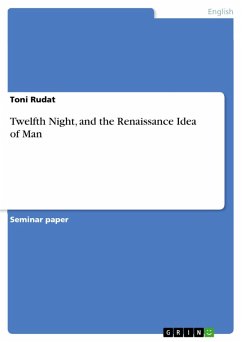Seminar paper from the year 2010 in the subject English Language and Literature Studies - Literature, grade: 1,7, RWTH Aachen University (Institut für Anglistik), course: Shakespeare's Comedies, language: English, abstract: SHAKESPEARE was one of the most famous renaissance writers. His play "Twelfth Night" was written during the English renaissance and maybe overlapped with the creation of the great tragedy Hamlet. The aim of this paper is to analyse in what way Shakespeare presented the characters of the play. Central to this discussion are the contemporary understandings of the human nature as well as the psychological assumptions concerning the mental distraction of people. It is undisputable that CICERO and his work "De officiis" had a great impact on the English renaissance humanists. The term "humanism" is a translation of the Italian word 'umanista' which denotes someone who teaches humanae literae. WELLS rightly claims that "the ruling ambition of the humanists was to recover the values of classical civilisation". Their ideal form of government was "a just society, ruled by a wise and responsible oligarchy". And "a humanist was someone who made it his business to understand humankind". So now the audience of Twelfth Night is confronted with an unordered society that consists of characters that absolutely lack the renaissance ideal of how humans should be. It is proposed to show how SHAKESPEARE manages to reorder the mad state Illyria - the setting of the play. Moreover the process of metamorphosing into ideal humans in the sense of the Renaissance understanding will be traced. Since there are reams of publications on SHAKESPEARE'S works a choice of some of them had to be carried out. ROBIN WELLS' monograph Shakespeare's Humanism served as a basis for this paper. WELLS portrays a very detailed image of what concerned the English renaissance humanists. Moreover he classifies SHAKESPEARE and his plays in the contemporary world-view. In order to reconstruct the nature of melancholy and madness ROBERT BURTON'S monograph "The Anatomy of Melancholy" was consulted. In this way it was possible to develop an understanding of the renaissance notion on mental derangement. BURTON'S examinations of this topic will be checked against SHAKESPEARE'S way of presenting mental illnesses. In a final step the question will be answered in how far SHAKESPEARE must have been acquainted with the disease pattern of distracted subjects.
Dieser Download kann aus rechtlichen Gründen nur mit Rechnungsadresse in A, B, BG, CY, CZ, D, DK, EW, E, FIN, F, GR, HR, H, IRL, I, LT, L, LR, M, NL, PL, P, R, S, SLO, SK ausgeliefert werden.


